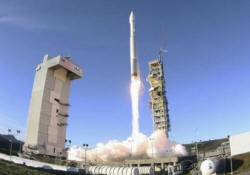|
 Lockheed-Boeing
Venture Says Rocket Launch Costs Lower Than Claimed By Rival Lockheed-Boeing
Venture Says Rocket Launch Costs Lower Than Claimed By Rival
 Send a link to a friend
Send a link to a friend
[May 20, 2014]
By Andrea Shalal
COLORADO SPRINGS Colo. (Reuters) - A joint
venture of Lockheed Martin Corp and Boeing Co on Monday said its rocket
launch costs were far lower than claimed by its rival, privately-held
Space Exploration Technologies, or SpaceX, which is suing the U.S.
government for shutting it out of the lucrative rocket launch business.
|
|
 United Launch Alliance President Michael Gass told reporters at a
space conference in Colorado that his company was providing rocket
launches to the U.S. Air Force and other customers for an average
cost of $225 million per launch, far less than the $460 million
amount cited by SpaceX. United Launch Alliance President Michael Gass told reporters at a
space conference in Colorado that his company was providing rocket
launches to the U.S. Air Force and other customers for an average
cost of $225 million per launch, far less than the $460 million
amount cited by SpaceX.
He said the price of each lighter-weight rocket launch was around
$164 million in a 36-unit block buy that is being challenged by
SpaceX. He also said ULA could provide additional lighter-weight
launches for under $100 million, about the same price that SpaceX
says its rocket launches will cost.
Overall, he said, the 36-launch contract had saved the U.S.
government about $4 billion.
SpaceX last month sued the Air Force to protest the award of a
multibillion-dollar, non-compete contract to ULA for 36 rocket
launches, saying the deal blocked companies like SpaceX from
competing for national security launches.

The Air Force says it will allow SpaceX to compete for a small
number of rocket launch orders once its Falcon 9 rocket is certified
to launch military satellites into space.
Gass said there were "a lot of rumors and innuendo" about the cost
of his company's rocket launch services, but the $460 million cost
estimate was inaccurate and actually included some funding being
used to certify the new SpaceX rocket.
SpaceX Falcon 9 rockets already fly cargo ships to the International
Space Station, a $100 billion research laboratory that flies about
260 miles (418 km) above Earth. The Falcon 9 also launches
commercial communications satellites into high-altitude orbits.
Air Force officials have said they are working with SpaceX to ensure
that their rockets are safe enough to risk flying U.S. military and
intelligence satellites that are worth more than $1 billion each.
[to top of second column] |

SpaceX wants the Air Force to reverse the sole-source award of 36
boosters to ULA and open the procurement to commercial competition.
The Air Force initially said 14 additional contracts would be open
to competition, although it has since delayed half those contracts
beyond 2019.
The SpaceX lawsuit comes amid growing concern about ULA's use of
Russian-made RD-180 engines for its Atlas rockets at a time when
Russia is facing sanctions for its annexation of Ukraine's Crimean
peninsula.
Gass said Moscow had not informed the company, or its Russian
supplier, about any plans to halt shipments of the RD-180 engines,
but said ULA was moving to accelerate production of its Delta
rockets, which do not use the Russian engines.
He gave no details on the likely cost of that move.
(Reporting by Andrea Shalal; Editing by Matt Driskill)
[© 2014 Thomson Reuters. All rights
reserved.] Copyright 2014 Reuters. All rights reserved. This material may not be published,
broadcast, rewritten or redistributed.
 |